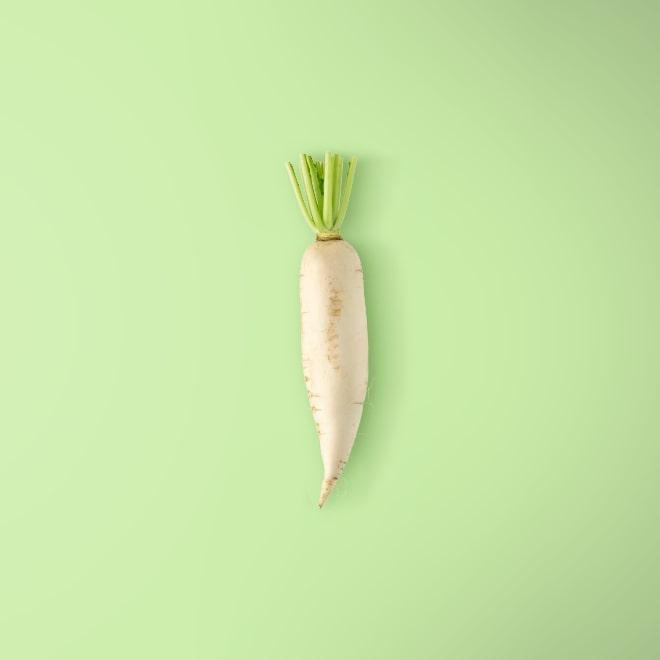Daikon




Daikon, meaning “big root” in Japanese, is known by many other names, including white radish, Asian radish, Oriental radish, Chinese radish, or Japanese radish. It is a winter radish with a mild sweet, fresh flavor usually characterized by large, rapidly growing leaves and a long, white root.
The skin is usually smooth and creamy white, but black-skinned varieties also exist. This vegetable grows primarily in Asia, namely in Southeast and East Asia.
Daikon is usually pickled and eaten as a vegetable in Japan, China, and other Asian countries. Daikon is also commonly used in diced form as an ingredient in soups, salads, curries, rice dishes, and various condiments. It can also be used raw in salads, shredded as a garnish or cooked in a variety of ways, such as in a stir-fry.
Daikon is nutrient rich vegetable with impressive qualities, such as its high nutrient content; it is highly sought after ingredient in many dishes.
Choose daikon that are firm and unwrinkled. Refrigerate, wrapped in a plastic bag, for up to a week.
Use daikon as a lighter alternative to potatoes. They'll add new dimensions of flavor and texture.
Braise daikon in your dishes. They absorb the flavorful braising liquid, mellow out, and get all sweet and juicy.
The leaves of the daikon are edible, so try blanching the greens and blend them with some garlic, nuts, and cheese to make a lightly spicy pesto.
The high concentration of vitamin C in daikon makes it an ideal partner for your immune system, as it stimulates the production of white blood cells and helps to speed healing and repair throughout the cells and tissues of the body.
Daikon oil is relatively rare, but it can be applied directly to the skin for anti-aging results.
Daikon can be pickled with carrots for Vietnamese banh mi sandwiches.
Daikon can be grated and steamed into Chinese dim sum cakes "turnip cakes" that are pan-fried.
It can be grated raw and served with sashimi, or fermented with Napa cabbage into Korean kimchi.
Daikon can be thinly sliced to add a nice crunch to shaved vegetable salads.
Daikon can be used to help prevent certain types of cancer, boost the immune system, reduce inflammation, improve digestion, detoxify the body, strengthen bones, aid respiratory health, and stimulate weight loss.
Daikon juice can help clear out phlegm and also eliminate bacteria and other pathogens, keeping your respiratory system healthy.
Daikon juice has also been shown to possess similar enzymes to those found in the human digestive tract. This can reduce constipation and increase nutrient uptake efficiency in the gut.
Corrections or improvements? Email us at
content@sidechef.com